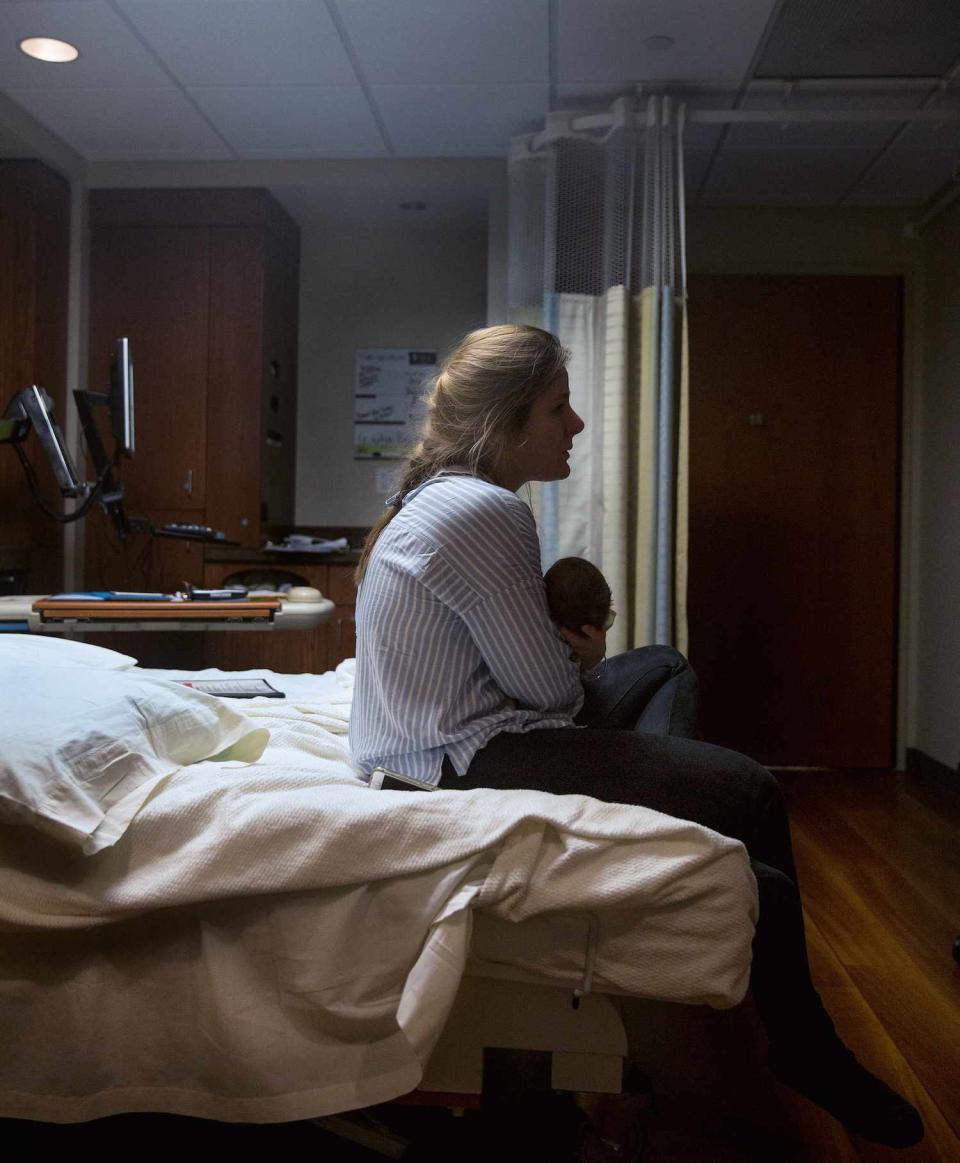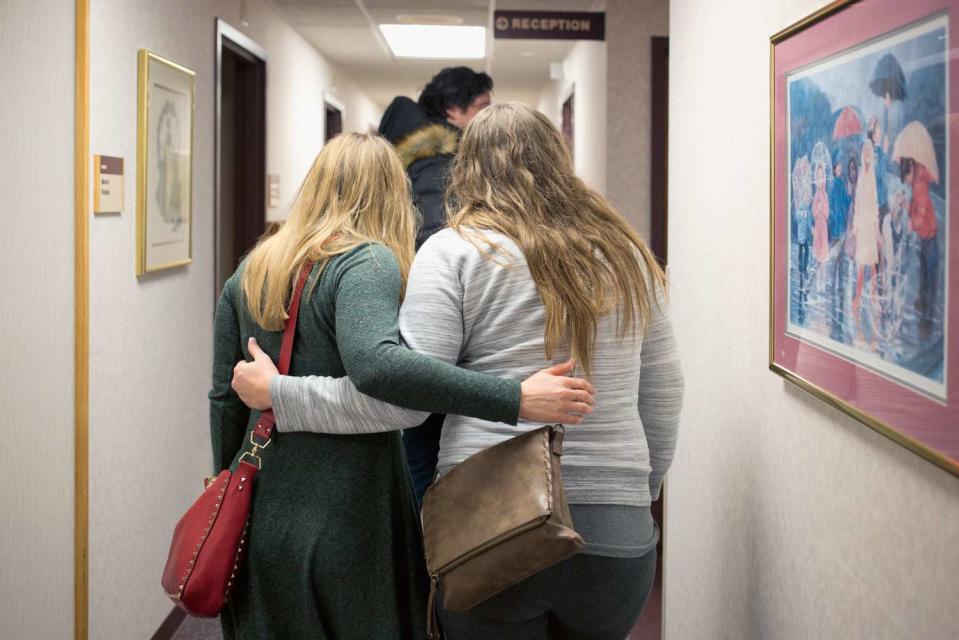Couple's Emotional Surrogacy Journey is Documented in Touching Photos
Over the past decade in the United States, welcoming a baby by surrogacy has become more common. According to the Centers for Disease Control and Prevention (CDC), the number of gestational carriers increased from one percent in 1999 to about two percent in 2013. However, as many couples who will pursue their family plans via surrogate learn, it is far from destigmatized, and in some countries, the practice is illegal. Switzerland is one of those countries, and it is also home for Jasmin and Andreas, a couple who suffered numerous failed attempts to conceive over the course of eight years. Jasmin and Andreas' journey to find a surrogate in the United States was documented by photographers Tom Licht and Djamila Grossman in a new book called Be Hers Be Mine: A surrogacy journey.

Djamila Grossman and Tom Licht Jasmin holds her son Levi after birth in Appleton, Wisconsin, USA.
Grossman and Licht were inspired to illustrate the couple's experience because it touches on such a sweeping variety of tough topics that affect all of us.
"We were fascinated with the different layers and questions their story and surrogacy in general offers: human relationships, science, ethical aspects, essential questions about human reproduction, faith, as well as questioning traditional ideas about family structure and belonging," Grossman shares. "We also wanted to put this journey of the two families in a bigger context of cultural history and humans always striving to discover new horizons and opening up new doors."
She notes that when couples face infertility and find adoption difficult, "surrogacy is often the last option to have a baby." And in Switzerland, it's "a very risky undertaking and the well-being of many people needs to be assured. If it is left in the dark legally, there are more avenues for abuse. So, better to talk about it in the open and then form an opinion about it."
RELATED: What is Gestational Surrogacy?
When Jasmin & Andreas Met Beth & Trevor
Jasmin and Andreas felt similarly about raising awareness. "Their intense suffering all these years paired with the feeling of being unable to open up and knowing that this affects so many other people inspired them to share their story," Grossman explains.
The couple was matched with Beth and Trevor, a couple from Wisconsin who "wanted to bring the joy they feel as a family to a couple that can't have children," according to Grossman.
As Beth noted in her Be Hers Be Mine interview, she was feeling unfulfilled and wanted "to help people in some way."
The Wisconsin mom explained, "I loved being pregnant. If I have been given the gift to carry children and we don’t want to have any more ourselves, really the next thing was to have children and to give them to somebody that can’t. ... To watch someone struggle with not being able to be a mom or a dad and knowing we have the opportunity to change that is the foundation of what made us decide to do surrogacy."
Through poignant images and interviews with Andreas, Jasmin, Beth, and Trevor, Grossman and Licht illustrate the many emotional, physical, and legal challenges faced by both couples.
"There is the risk to fail in medical terms, such as losing the embryo, and carrying the responsibility for another woman," Grossman notes. "They have to open up and form a relationship with strangers in a very intimate way. They have to put trust in someone else when they actually feel very vulnerable. In addition, they are violating the law even though they are usually very law-abiding people."
But as Jasmin explained in the book, taking those risks was worth the end result—especially once she and Andreas connected with Beth and Trevor.

Djamila Grossman and Tom Licht Beth and her husband in front of their home at Appleton, Wisconsin, USA.
Jasmin admitted in her interview that she and her husband were initially afraid of Beth. "She was a threatening figure because she is the one who is able to get pregnant, which of course is something I can't," she shared. "When you're told as a woman that you can't carry children and you should let another woman do that for you, then that's a thought you don't find very comforting, do you? We were so desperate and didn't want to wait any longer so we thought, okay, let's just talk to them."
Thankfully, during their first Skype session, the couples "immediately clicked," Jasmin said. "From that moment on, everything was good. We didn't need any time to get used to each other. We even decided during that first conversation we would have a baby together. It was immediately very clear from both sides. We couldn’t believe they really wanted to do this for us. It taught me humility to see that other people have an emotional depth that I probably don't have. It changed us. It wasn’t easy to accept, because you don’t want to owe people anything. There is nothing we can ever do to make up for this."

PHOTO: Djamila Grossmann and Tom Licht Jasmine and surrogate Beth, right, a few days before birth in Appleton, Wisconsin, USA.
What the Experience Taught the Photographers
Grossman observes that Jasmin and Beth ultimately grew to have "deep love and trust" for one another. She says she and Licht were caught off-guard by "the willingness of both couples and their families to open up their family units, come together and truly create a baby together. Having no children of our own, we were amazed how strong the wish to have a baby can be and how much suffering it can create to not be able to fulfill it." The photographers were also "amazed by the volatility of feelings from doubts and fear to hope and love, how existential it felt to them."
But perhaps the overall feelings Grossman and Licht came away with after working on Be Hers Be Mine were gratitude and admiration. "We are grateful for the trust these family put in us and our work," Grossman says. "They are immensely courageous to open up so deeply and thoroughly."

Djamila Grossman and Tom Licht Jasmin and the surrogate mother Beth on the way to the ultrasound examination in the hospital in Appleton, Wisconsin, USA.
Ultimately, they hope the book serves to reassure other couples facing similar battles that they are not alone. They also want it to spur a conversation about surrogacy.
"Showing the motivations of everyone involved leaves space for readers to form their own opinion about surrogacy," Grossman notes. "We need to talk about this in the open because it affects the root of who we are and where we come from as humans."

